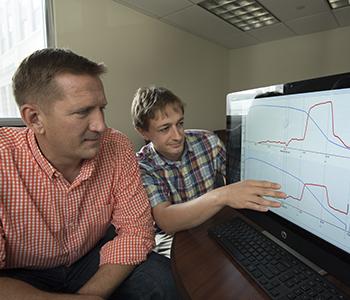There are many solutions to the challenge of producing food for an ever-growing human population. One approach is to simply produce more food; we have seen successes on this front from research teams at the University of Wisconsin, Madison and the University of Illinois, Urbana-Champaign. Another approach, proposed by biologists at Washington University, St. Louis, attempts to increase quality over quantity, increasing nutrient content in existing crops.
Read MoreTags: Washington University in St. Louis, 2015, BioResearch Product Faire Event, MO, St Louis, UWash
Our immune system is our best defense against sickness on a day-to-day basis, and bioresearchers have been trying to ramp it up to handle bigger threats for some time now. A research lab from MSU found that fish oil can significantly boost immune activity, and a UCSF team discovered genetic “enhancers” that help prevent autoimmune diseases. At the Washington University in St. Louis, scientists are finding that our immune system has the potential to be much stronger and are discovering how to tap into that potential.
Read MoreTags: Washington University St. Louis, WashU, 2015, BioResearch Product Faire Event, MO, St Louis
A rational approach to tackling diabetes using life science research is to focus on insulin. We’ve seen a research team at Emory University transplant insulin-producing cells, and we’ve reported on an Urbana-Champaign team trying to release insulin in patients’ cells. Now researchers at Washington University at St. Louis are taking a new approach by directly reducing blood sugar without the use of insulin.
 Brian Finck (image left, courtesy WUSTL) believes that rather than rely on insulin to lower blood sugar in patients with diabetes, it’s easier to cut out the middle man and reduce glucose levels using genetics. He and fellow WUSTL professor Kyle McCommis found that shutting down a particular liver protein dramatically reduced glucose production in the liver.
Brian Finck (image left, courtesy WUSTL) believes that rather than rely on insulin to lower blood sugar in patients with diabetes, it’s easier to cut out the middle man and reduce glucose levels using genetics. He and fellow WUSTL professor Kyle McCommis found that shutting down a particular liver protein dramatically reduced glucose production in the liver.
“We think this strategy could lead to more effective drugs for type 2 diabetes,” says Finck, who is an associate professor of medicine in the Division of Geriatrics and Nutritional Science. “A drug that shuts down glucose production has the potential to help millions of people affected by the most common form of diabetes.”

(Brian N. Finck, PhD (left), and Kyle S. McCommis, PhD analyze blood sugar levels to evaluate their new strategy. Image courtesy WUSTL)
The team has already initiated clinical trials using the drug compound MSDC-0602. So far, the drugs have been successful in inhibiting the protein and reducing blood sugar levels. Dr. Finck is working with the biopharmaceutical company Metabolic Solutions Development Co. to facilitate production of the drug.
Funding for this research came from the National Institute of Diabetes and Digestive and Kidney Diseases and the National Institute on Alcohol Abuse and Alcoholism of the National Institutes of Health as well as the Foundation for Barnes-Jewish Hospital and the Robert A.Welch Foundation. For additional information about funding for research at Washington University in St. Louis, read our free WUSTL Funding Statistics Report, available via the link below:
Read MoreTags: WashU, Washington University in St. Louis, 2015, BioResearch Product Faire Event, MO, St Louis
One of the most pressing pursuits in bioscience is increasing agricultural production. The Food and Agriculture Organization estimates that, as a planet, we need to produce 70 percent more food by the year 2050 in order to keep up with increasing population. We have already shone our spotlight on several university research teams who are tackling this problem, like the UW team attempting to increase flowering rates and the UIUC team who spliced algae genes to increase photosynthesis. Now we look to Washington University in St. Louis for some novel ideas about optimizing photosynthesis.
Read MoreTags: WashU, Washington University in St. Louis, 2015, BioResearch Product Faire Event, MO, St Louis
Destroying a tumor is sometimes only the beginning when it comes to fighting cancer. We’ve seen a UCLA team eradicate tumor remnants in the bloodstream and a Cincinnati researcher who developed a method to prevent breast cancer tumors from leaving behind stem cells from which they could regenerate. Now a team at Washington University in St. Louis has discovered a way to shut down the stem cells in the tumors of brain cancer.
Read MoreTags: WashU, 2015, BioResearch Product Faire Event, MO, St Louis, Washington Univsersity St. Louis
For some diseases, one can “carry” the disease without showing any of its symptoms. In the case of Fragile X syndrome, a cause of autism and intellectual disability, there’s no such concept. However, researchers at Washington University at St. Louis are working on a way to reduce these carrier symptoms.
Read MoreTags: WashU, 2015, BioResearch Product Faire Event, MO, St Louis, Washington Univsersity St. Louis
If kidney cancer is diagnosed before it spreads, then doctors have a much better chance of curing it. In fact, 80 percent of kidney cancer patients who get their cancer diagnosed early survive. Unfortunately, most patients don’t find out about their affliction until too late. At Washington University, St. Louis, a group of researchers is working on a more proactive approach to detecting the disease.
Read MoreTags: WashU, Washington University in St. Louis, 2015, BioResearch Product Faire Event, MO, St Louis
 As one of only three large-scale, NIH funded genome centers in the United States, the Genome Institute at Washington University School of Medicine in St. Louis has been a large contributer to cancer research and the research of child illnesses since it was founded in 1993.
As one of only three large-scale, NIH funded genome centers in the United States, the Genome Institute at Washington University School of Medicine in St. Louis has been a large contributer to cancer research and the research of child illnesses since it was founded in 1993.
Tags: Washington University St. Louis, Midwest, WashU, 2015, BioResearch Product Faire Event, genomics research, MO, St Louis, new funding
 In June 2015, the Medical School at Washington University in St. Louis will substantially grow thanks to a new medical building that is currently under construction. The new $81 million building, which began construction in 2013, will be composed of 138,000 square-feet of lab space in six-stories for researchers in different life science disciplines. (Image courtesy of Wikimedia Commons)
In June 2015, the Medical School at Washington University in St. Louis will substantially grow thanks to a new medical building that is currently under construction. The new $81 million building, which began construction in 2013, will be composed of 138,000 square-feet of lab space in six-stories for researchers in different life science disciplines. (Image courtesy of Wikimedia Commons)
Tags: Midwest, Washington University, WashU, new research building, 2015, BioResearch Product Faire Event, MO, St Louis, new Building
Researchers at Washington University in St. Louis have received an immense amount of additional funding from the National Institute on Aging to assist them on the first large-scale clinical trial to study Alzheimer's disease that is underway. This clinical trial, called the Dominantly Inherited Alzheimer’s Network Trials Unit (DIAN-TU) will work with people who have dominantly inherited forms of Alzheimer's to identify new drugs that can slow the onset of the disease, or stop it altogether.
Beginning with $5.5 million in funding this year, the trial will continue to receive funding from the NIH over the next five years to total $26 million. The National Institute of Aging has been supporting this research since 2012, when the project began. This new funding will allow the trial to add an additional 300-400 participants to the study, as well as assist the research team in adding new drugs to the study. The trial is being run in locations in the United States, Canada, Europe, and Australia, and this funding will help add 10-15 more locations.
Read MoreTags: Midwest, Washington University, WashU, 2015, BioResearch Product Faire Event, MO, Washington Univsersity St. Louis

